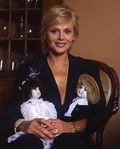Notable individuals
This section needs additional citations for verification .(July 2015) |
The table below includes Britons with significant recent Nordic ancestry.
| Name | Image | Ancestry | Occupation and notes |
|---|---|---|---|
| Jacob Aagaard |  | Denmark | Danish-born Scottish chess grandmaster |
| Alicia Agneson |  | Sweden | Actress who moved to London at age 15 |
| Damon Albarn |  | Denmark | English-Icelandic musician, singer and songwriter of Danish descent through his mother. |
| Alexandra of Denmark |  | Denmark | Queen of the United Kingdom, consort of Edward VII, King of the United Kingdom and Emperor of India |
| Marit Allen | Norway | fashion journalist and costume designer | |
| Sir Ove Arup | Denmark | British engineer, founder of Arup | |
| Richard Ayoade |  | Norway | British comedian and actor with a Norwegian mother. |
| Svend Bayer | Denmark | Potter | |
| Elynor and Zoe Bäckstedt | Sweden | Welsh racing cyclists, daughters of Swedish racing cyclist Magnus Bäckstedt | |
| Antonia Bernath |  | Norway | Actress |
| Tom Blomqvist |  | Sweden | Racing driver, son of Swedish rally driver Stig Blomqvist |
| MyAnna Buring |  | Sweden | actress |
| W. D. Caröe | Denmark | Architect | |
| Georgina Castle | Sweden | Actress | |
| Izzy Christiansen |  | Denmark | Former footballer for Manchester City, Lyon, Everton and England |
| Roald Dahl |  | Norway | Author |
| Sophie Dahl | Norway | Fashion model and granddaughter of Roald Dahl | |
| Camilla Dallerup | Denmark | Ballroom dancer, a former professional on BBC One's Strictly Come Dancing | |
| Sandra Dickinson | Finland | actress | |
| Carl Johannes Edwards | Finland | stained glass artist | |
| Britt Ekland |  | Sweden | Actress and Bond Girl |
| Johan Eliasch | Sweden | UK-based businessman, chairman & CEO of sporting goods manufacturer Head and deputy treasurer of the Conservative Party | |
| Harry Julius Emeléus |  | Finland | chemist |
| Mariella Frostrup | Norway | Journalist and radio and television presenter | |
| Adeline Genée |  | Denmark | Ballet dancer |
| Charles Hambro | Denmark | Banker and politician, part of the Hambros Banking dynasty | |
| Gustav Holst |  | Sweden | English composer and music teacher, best known for his orchestral suite The Planets |
| Agnete Hoy | Denmark | potter | |
| Ashley Jensen |  | Denmark | Scottish actress |
| Ulrika Jonsson | Sweden | Television personality | |
| Synnøve Karlsen | Norway | Actress | |
| Jessica Kellgren-Fozard | Sweden | YouTuber | |
| Jonas Kellgren | Sweden | First professor of rheumatology in the UK | |
| Felix Kjellberg |  | Sweden | Swedish YouTuber who moved to Brighton. |
| Gertrude Lawrence |  | Denmark | actress / performer |
| Magnus Lund |  | Norway | English rugby union player |
| John Lundstram |  | Norway | English footballer |
| Jessica Madsen | Denmark | actress | |
| Mikko Mäkelä |  | Finland | filmmaker |
| Magnus Magnusson | Iceland | Television presenter, notably for the BBC's Mastermind , and novelist | |
| Sally Magnusson | Iceland | News presenter and daughter of Magnus Magnusson | |
| Rosita Spencer-Churchill, Duchess of Marlborough | Sweden | Artist and noblewoman | |
| Jan Mølby |  | Denmark | Former professional footballer who spent much of his career at Liverpool F.C. |
| Kirsten O'Brien |  | Norway | TV presenter |
| Nils Ramming | Sweden | footballer | |
| Hans Rausing |  | Sweden | Billionaire heir to the Tetra Pak/Tetra Laval dynasty |
| Sigrid Rausing |  | Sweden | Philanthropist and publisher |
| Toby Regbo |  | Norway | Actor |
| Christian Rodska | Denmark | Actor | |
| Christian Salvesen | Norway | Shipowner and businessman | |
| Edward Theodore Salvesen | Norway | Scottish lawyer, politician and judge | |
| Peter Schmeichel |  | Denmark | Former Manchester United goalkeeper; his son Kasper spent his childhood in Manchester. |
| Sasha Siem |  | Norway | Singer-songwriter and composer |
| Sofia Sjöborg | Sweden | Equestrian; born and raised in London and represents Sweden in international competitions. | |
| Nicholas Ashley-Cooper, 12th Earl of Shaftesbury | Sweden | Peer and runner | |
| Steve Simonsen | Denmark | English goalkeeper | |
| Rupert Svendsen-Cook | Norway | English Formula BMW UK race car driver | |
| Georgia Tennant |  | Finland | actress and producer |
| Sandi Toksvig |  | Denmark | Comedian |
| Charly Wegelius |  | Finland | Directeur sportif and former racing cyclist, son of Finnish equestrian Christopher Wegelius |
| Christian Wolmar |  | Sweden | Journalist, author, and railway historian |
| Patrick Wymark | Finland | English actor |




